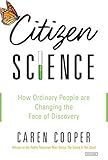Citizen science : how ordinary people are changing the face of discovery / Caren Cooper.
Publisher: New York, N.Y. : The Overlook Press, 2016Copyright date: 2016Edition: First editionDescription: 294 pages, 8 unnumbered pages of plates : color illustrations ; 24 cmContent type:- text
- unmediated
- volume
- 9781468308679
- 146830867X
- 500 23
- Q180.55.C54 C66 2016
- SCI034000 | SCI075000
| Item type | Current library | Call number | Copy number | Status | Date due | Barcode | Item holds |
|---|---|---|---|---|---|---|---|
 BOOK
BOOK
|
NCAR Library Foothills Lab | Q180.55 .C54 .C66 2016 | 1 | Available | 50583020009126 |
Cites the essential contributions of millions of ordinary people who contribute to the scientific process by volunteering in cooperation with scientists to help collect and discover information, tracing the history of citizen scientists and how they are reshaping scientific awareness.
"Think you need a degree in science to contribute to important scientific discoveries? Think again. All around the world, in fields ranging from astronomy to zoology, millions of everyday people are choosing to participate in the scientific process. Working in cooperation with scientists in pursuit of information, innovation, and discovery, these volunteers are following protocols, collecting and reviewing data, and sharing their observations. They are our neighbors, our in-laws, and people in the office down the hall. Their story, along with the story of the social good that can result from citizen science, has largely been untold, until now. Citizen scientists are challenging old notions about who can conduct research, where knowledge can be acquired, and even how solutions to some of our biggest societal problems might emerge. In telling their story, Cooper will inspire readers to rethink their own assumptions about the role that individuals can play in gaining scientific understanding and putting that understanding to use as stewards of our world. Citizen Science uncovers how people from all walks of life--retirees monitoring precipitation with standardized rain gauges, inmates raising, tagging, and releasing monarch butterflies to track their migration from the prison yard, video gamers solving biochemistry puzzles to help find cures for diseases like Alzheimer's, and mothers advocating for healthy drinking water and clear air for their families and communities--can tap into their potential to make scientific discoveries that lead to meaningful, positive change."--Jacket.
